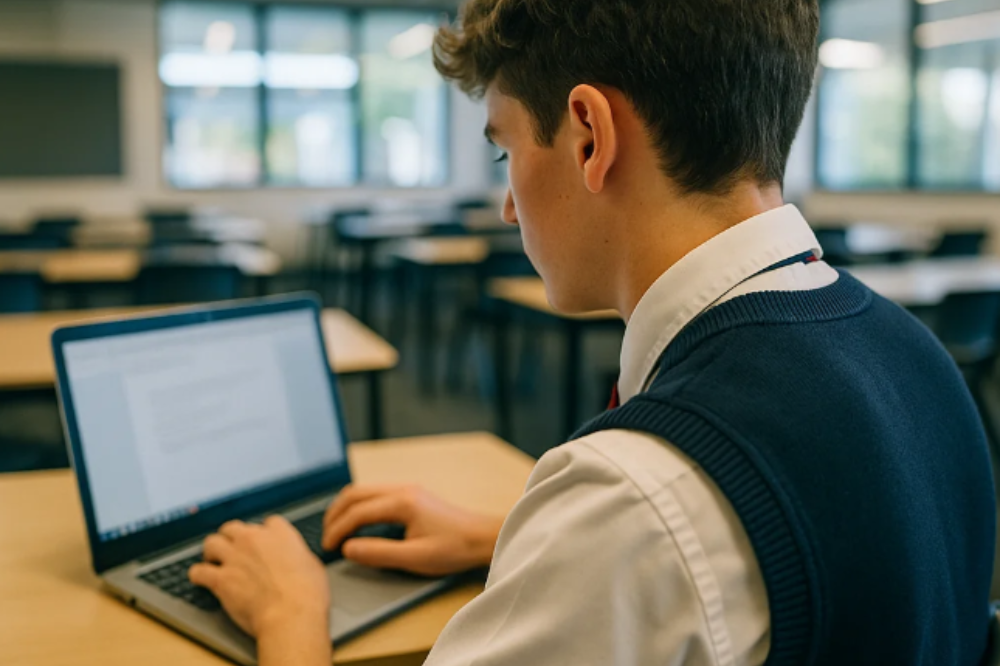
As digital technologies weave deeper into the fabric of daily life, researchers have been studying both the health and educational impacts of digital devices on young people.
A 2023 paper published in Neuropsychology Review found problematic screentime impacts the ability to concentrate and the so-called executive functions, which include impulse control, planning, organisation and problem solving.
The study followed an international research project, including Harvard Medical School (U.S.) and Alberta Teachers Association (Canada), which found that a staggering 83% of parents think their children are negatively distracted by digital devices.
UniSA researcher Dr Jamie Manolev says many edtech tools have been adopted without understanding their long-term educational or ethical impacts.
“One of the factors contributing to this situation is the optimistic views held by many in education and government, of technologies to improve schooling and learning. Hence, there is a strong appetite to adopt their use in schools,” Dr Manolev told The Educator.
“However, despite this appetite the regulatory policy frameworks necessary for responsibly governing the use of education technologies has yet to be developed.”
Other experts say while setting boundaries on young people’s screentime remains important, a sharper focus is needed on ensuring kids are also engaging in physical activity and meaningful social interaction — both crucial for healthy learning and development.
Screen time, they argue, should be just one part of a broader strategy that looks at how children are using devices, not just how long.
Recognising this, an evidenced-based program has been launched to help Year 7-9 students develop healthy screen habits, manage their digital wellbeing, and make better decisions about their digital habits.
Black Dog Institute, in partnership with the Bupa Foundation, has launched ‘Teens & Screens’, a free evidence-informed classroom program that is backed by research from the Future Proofing Study – a large longitudinal study on adolescent mental health in Australia.
The ready-to-use program, developed in partnership with young people, provides teachers with everything they need to deliver an engaging session on digital literacy and wellbeing. It also includes a step-by-step facilitator guide, a customisable interactive presentation, and resources for students and parents.
Researchers at Black Dog Institute are also currently developing a Teens & Screens program tailored for students in Years 10–12. This program will address the unique challenges faced by older adolescents and will be available later in 2025.
Striking a healthy balance
Associate Professor Aliza Werner-Seidler from Black Dog Institute and lead researcher on the project, highlighted the need for schools to educate students about how cultivating a positive online experience, what the risks are and how to mitigate those.
“Teens are constantly being told that screen time is bad—but that’s not the full picture. Not all online activities are equal and there is nuance that needs to be considered in what activities young people are engaging with, and with whom,” Dr Werner-Seidler said.
“Screens are an integral part of their lives—from socialising to learning and entertainment. Instead of fuelling guilt or fear, we’re here to share the real facts—the good and the bad—based on research and evidence, so teens can make better informed choices.”
The research highlights that while online platforms can present challenges, they can also offer opportunities to support young people’s wellbeing – if used with awareness and balance.
“We want to give young people the tools to understand whether what they’re doing online affects how they feel so that they can navigate the digital world with confidence,” she said. “By giving them knowledge, not just rules, we’re helping them take control of their digital habits in a way that works for them.”
Bupa Chief Sustainability & Corporate Affairs Officer, Roger Sharp says the Bupa Foundation is proud to invest in this key early intervention program.
“As the use of technology continues to rise, the Teens & Screens program is critical to tackling one of the biggest challenges of our time: how young people engage with technology and impact of this on their mental health,” Sharp said.
“Together we can empower young people and their families to create healthier habits and balance their time between the online and real worlds.”

